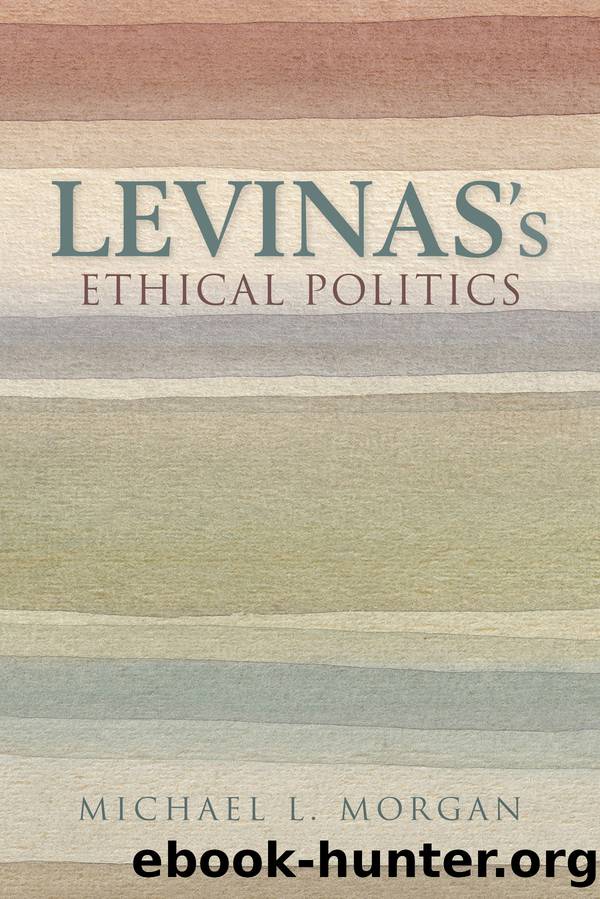Levinas's Ethical Politics by Morgan Michael L.;

Author:Morgan, Michael L.;
Language: eng
Format: epub
Publisher: Indiana University Press
Published: 2016-08-15T00:00:00+00:00
LEVINAS, GAVISON, AND GANS ON ISRAEL AND NATIONALISM
It is not difficult to see how Levinas would differ from extreme religious Zionists, on the one hand, and post-Zionist critics of Israel, on the other. Locating him within the broader middle ground of liberal views is less easy to do. My discussion of Gavison has been intended to begin such a process. Originally, I had planned to follow this discussion of a Levinasian response to Gavison with a similar account of how Levinas might react to the arguments of Chaim Gans, both in A Just Zionism and in his more recent A Political Theory for the Jewish People. As interesting and valuable as such an account might be, however, it would require much more space than I can now allot. In its place, I want to limit myself to asking one question, what Levinas would say about the central difference between Gavisonâs Zionism and that of Gans, at least as Gans portrays it. In his more recent work, Gans distinguishes among three Zionisms. He calls one âmainstreamâ or âproprietaryâ Zionism, a second âhierarchicalâ Zionism, and a third, his own position, âegalitarianâ Zionism.â73 Gans rejects the historical-propriety position, which justifies the Zionist return to the Land of Israel on the grounds that the land and its political institutions are the property of the Jewish people and have been since antiquity. He also rejects unqualifiedly the post-Zionist denial that the Jewish people collectively has any right to hegemony over the land and any right to control its political institutions. Dismissing these opposing extremes, however, he realizes that there is greater affinity between his own view and that of the âhierarchicalâ Zionists. He associates Gavison with this second position, âhierarchicalâ Zionism or the Zionism of academics and legal scholars, and he distinguishes it from his own position, which also relies on a right to self-determination but which strives for equality for all the citizens of the state.
Gans argues that Gavisonâs position, which is based on a right of peoples or nations to self-determination, cannot account by itself for the territorial feature of Zionism, the location of the Jewish state and its particular boundaries. He points out that Gavison claims that in the period of the earlier Yishuv, both the Arabs who resided in the land and the Zionist settlers had the liberty to inhabit the land, but neither had the right to do so and to exclude the other. Gans believes that the Arabs had more than a liberty, but the core of his objection or worry about Gavisonâs view is that he doubts that the Jewish people had any liberty at all to occupy the land. Without calling upon some historical considerations, there is no reason to think that it did. There is, after all, no blanket liberty to occupy lands, even within the constraint that there is no violence against the inhabitants, even for individuals and certainly not for collectivities or peoples. To admit that there were would, would be to condone colonialism everywhere, without any further justification.
Download
This site does not store any files on its server. We only index and link to content provided by other sites. Please contact the content providers to delete copyright contents if any and email us, we'll remove relevant links or contents immediately.
Getting It, Then Getting Along by L. Reynolds Andiric(617)
Religion and Politics Beyond the Culture Wars : New Directions in a Divided America by Darren Dochuk(408)
Global Justice, Christology and Christian Ethics by Lisa Sowle Cahill(396)
Positive Psychology in Christian Perspective: Foundations, Concepts, and Applications by Charles Hackney(327)
Forgiveness and Christian Ethics by Unknown(315)
The Horrors and Absurdities of Religion by Arthur Schopenhauer(221)
Douglas Hamp The First Six Days by Unknown(217)
Insurgency, Counter-insurgency and Policing in Centre-West Mexico, 1926-1929 by Mark Lawrence(213)
Christian Martyrdom and Christian Violence by Matthew D. Lundberg;(211)
The Oxford Handbook of Greek and Roman Mythography by R. Scott Smith;Stephen M. Trzaskoma;(200)
Beyond Heaven and Earth by Gabriel Levy(195)
The Bloomsbury Reader in Christian-Muslim Relations, 600-1500 by David Thomas;(192)
God and Eros by Patterson Colin;Sweeney Conor;(191)
Autobiography, Volume 2: 1937-1960, Exile's Odyssey by Mircea Eliade(179)
Cult Trip by Anke Richter(177)
Witches: the history of a persecution by Nigel Cawthorne(172)
An Introduction to Kierkegaard by Peter Vardy(164)
The Myth of Disenchantment by Jason A. Josephson-Storm(161)
The Believer by Sarah Krasnostein(158)
